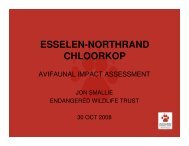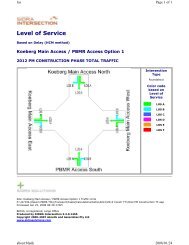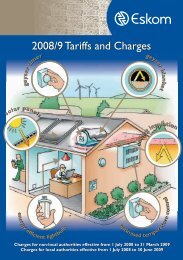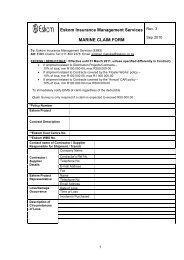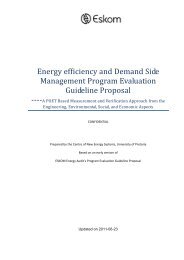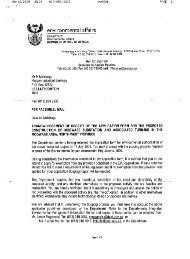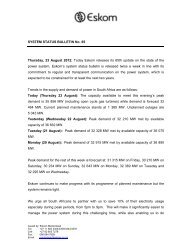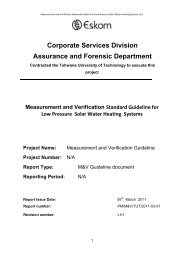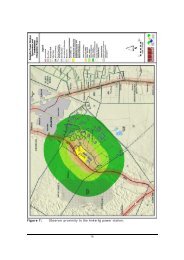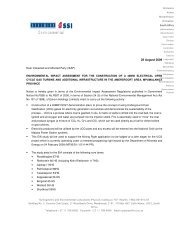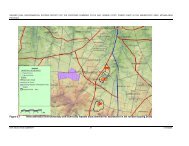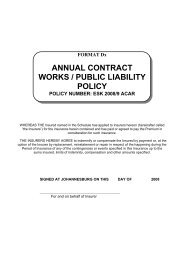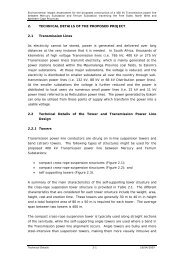Part 2 - Eskom
Part 2 - Eskom
Part 2 - Eskom
Create successful ePaper yourself
Turn your PDF publications into a flip-book with our unique Google optimized e-Paper software.
ENVIRONMENTAL SCOPING REPORT FOR THE PROPOSED 40MW OPEN CYCLE GAS TURBINE POWER<br />
PLANT IN THE AMERSFOORT AREA, MPUMALANGA<br />
8.6.1. Generic Potential Impacts<br />
Bohlweki-SSI Environmental<br />
If the plant and associated infrastructure is located within a wetland, then the<br />
assumption has been made that the wetland is likely to be completely transformed,<br />
resulting in the complete loss of wetland habitat as well as functionality of the<br />
affected part of the wetland (and possibly the functionality of the downstream portion<br />
of the wetland). Wetland functionality can be divided up into a number of components<br />
including ecological value, hydrological functioning, water quality enhancement and<br />
socio-economic functionality, amongst others. All of these functions are intrinsically<br />
related to, and are dependent upon the physical components of the wetland,<br />
including the soils and vegetation contained within the wetland as well as other biotic<br />
components that are adapted to life within wetlands. The presence of these biotic<br />
components is in turn closely related to the nature of the hydrology of the wetland,<br />
which in the hydro-geomorphic forms found in the study area is characterised by the<br />
retention of, and diffuse flow of water through the wetland in the case of valley<br />
bottom wetlands, or the interface with groundwater (discharge) in the case of<br />
hillslope seepage wetlands.<br />
The combination of the hydrology, hydromorphology and biota (especially vegetation)<br />
within the wetland allow certain chemical and ecological processes to occur that<br />
provide much of the wetland’s functionality. If the physical characteristics of the<br />
wetland are transformed, or destroyed, the hydrology, hydromorphology and<br />
ecological assemblages within the wetland will typically be altered. The resulting<br />
impact is the loss/destruction of functionality and value of the wetland. If a<br />
development is built upon a wetland, the loss and destruction of the wetland and<br />
associated impact on functionality is often complete and irreversible. It has been<br />
assumed that this level of impact will result in the case of the proposed development<br />
if plant infrastructure is located within wetlands. However <strong>Eskom</strong> has indicated that<br />
mining infrastructure will not be located within wetlands, and it appears likely that the<br />
same consideration for the locating of the plant and infrastructure will be applied; in<br />
this event the plant and associated infrastructure would not physically impact<br />
wetlands.<br />
<strong>Eskom</strong> Generation has indicated that there would be no discharges of water or<br />
wastewater from the plant and associated infrastructure. For this reason the plant<br />
would be highly unlikely to cause the pollution of any surface water resource through<br />
direct discharge of wastewater. In the event of the accidental discharge of polluted<br />
water from the plant into the surrounding environment, the proximity of the<br />
plant/infrastructure to a potential surface water receptor is proportionate to the risk of<br />
the pollution of the surface water resource.<br />
8.6.2. Site-specific Impacts<br />
It is understood that the proposed 40MW electrical open cycle gas turbine (OCGT)<br />
plant is planned to be constructed in an area on the site already cleared under the<br />
auspices of a prospecting license issued by the former Department of Minerals and<br />
Energy for the UCG project, which included consent for the construction of a 28MW<br />
plant.<br />
E02.JNB.000308<br />
ESKOM HOLDINGS LIMITED<br />
01<br />
61<br />
08/10/2009



